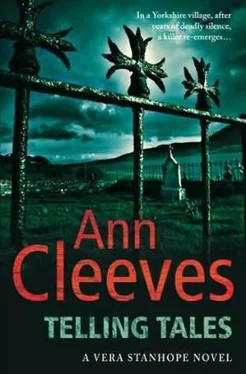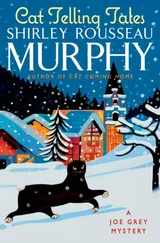Ann Cleeves - Telling Tales
Здесь есть возможность читать онлайн «Ann Cleeves - Telling Tales» весь текст электронной книги совершенно бесплатно (целиком полную версию без сокращений). В некоторых случаях можно слушать аудио, скачать через торрент в формате fb2 и присутствует краткое содержание. Жанр: Детектив, на английском языке. Описание произведения, (предисловие) а так же отзывы посетителей доступны на портале библиотеки ЛибКат.
- Название:Telling Tales
- Автор:
- Жанр:
- Год:неизвестен
- ISBN:нет данных
- Рейтинг книги:5 / 5. Голосов: 1
-
Избранное:Добавить в избранное
- Отзывы:
-
Ваша оценка:
- 100
- 1
- 2
- 3
- 4
- 5
Telling Tales: краткое содержание, описание и аннотация
Предлагаем к чтению аннотацию, описание, краткое содержание или предисловие (зависит от того, что написал сам автор книги «Telling Tales»). Если вы не нашли необходимую информацию о книге — напишите в комментариях, мы постараемся отыскать её.
Telling Tales — читать онлайн бесплатно полную книгу (весь текст) целиком
Ниже представлен текст книги, разбитый по страницам. Система сохранения места последней прочитанной страницы, позволяет с удобством читать онлайн бесплатно книгу «Telling Tales», без необходимости каждый раз заново искать на чём Вы остановились. Поставьте закладку, и сможете в любой момент перейти на страницу, на которой закончили чтение.
Интервал:
Закладка:
Two people were walking along the beach, close to the tide line A man and a woman. Not birdwatchers. Birdwatchers were regular visitors to the Point, but they all dressed the same and they carried binoculars and telescopes. Besides, they didn’t wander much onto the beach. They stood where he was standing now to get a panoramic view of the passing seabirds, or they pushed their way through the paths cut in the undergrowth. James wasn’t sure what had first attracted his attention to the walkers. Perhaps it was the man, something about the way he was walking was familiar. He was wearing a long gabardine coat, too smart for a stroll on the beach and his hands were thrust deep into his pockets. And then there were his shoes. Most people would put on Wellingtons or boots, but he wore polished leather shoes. The salt would stain them. James crouched so he couldn’t be seen and continued watching. The man stopped suddenly, but he was still talking. The abrupt halt had only added emphasis to the words, demanding that the woman stop too and give him her full attention.
It was Keith Mantel. Since he and Emma had moved back to Elvet, James had managed to avoid him, and he looked older than when James had last seen him. His hair was grey, cut very short. Perhaps he’d put on a bit of weight. James wasn’t sure but he thought the face was fatter. Then the man turned and the couple continued on their walk and immediately James thought he must have been mistaken. He’d been thinking too much of Mantel recently and in his tiredness had dreamed him up. This was a respectable couple, taking the air before going into the city to resume their stressful lives. Or a not-so-respectable businessman snatching a few illicit moments with his mistress. Though there seemed to be nothing romantic about this encounter. Rather, it was confrontational. The woman deliberately allowed a space to grow between them, stooped and picked up a pebble and threw it into the water with a violence which suggested anger.
James turned away and walked back to the road where the company car was parked. Emma had enough stories and fancies for both of them. In the car, the heater was full on, blasting hot, stale air. James switched it off and backed away from the river. He drove slowly up the narrow track past the small group of houses and the cafe which provided mugs of tea and piles of chips to visitors in the summer. He was about to speed up a little, when he braked and pulled into the public car park. He was too curious, after all, to let it go. There were only two vehicles there, standing side by side, facing out into the estuary. One was a smart, black saloon, the other a boxy four by four. On the side of the latter was painted the logo which James had seen on the notice at the pilot office in Hull. And the words Mantel Development. Not his imagination then. Not a dream. On this occasion at least he wasn’t hallucinating.
Who was the woman? She was more mature than the usual lovers. When James had known him Mantel always went for young women. Inexperienced. Had he hoped some of their innocence would rub off on him? And more recently James had heard rumours in the village. The women in church loved to be shocked. Another young lover, he’d understood, had moved into the smart house where Mantel still lived. The woman on the beach had been well preserved, well groomed in an efficient, businesswoman sort of way, but she had been middle aged. In her forties at least. James switched off the engine and got out of his car. He walked slowly round the black saloon, not touching it, but peering in through the windows. It was a top of the range model with leather seats, all the latest gadgets on the dashboard. There was none of the mess which Emma gathered in her car baby clothes, sweet wrappers, Coke cans. Not even a brief case. But on the passenger seat was a pile of letters. The woman had picked up her mail before setting off, though she hadn’t had time to open it. The top envelope was face up and was an advertising circular from a credit card company. James recognized the printing. At least now he had a name for the woman. The letter was addressed to Caroline Fletcher.
When he finally reached home it had gone ten o’clock. The house was quiet. Matthew would be in his cot, just settled for his morning nap. Emma was in the living room. She’d lit a fire; he could smell the pine logs as soon as he came into the house. She was sitting in a big armchair, her legs tucked under her, and there was a book lying in her lap. Flaubert’s Emma Bovary in French. Her eyes were shut and her breathing was regular. When he approached her she stirred.
“Oh God,” she said. “I’m so sorry. I had a dreadful night with the baby. I must have dozed off. And you must be exhausted.”
“Not too bad,” he said. “Second wind.” He nodded at the book. “What’s this?”
The question seemed to make her uncomfortable. “You know what they say about languages use them or lose them. I might want to go back to teaching. I don’t want to get rusty.”
“Good idea. Coffee?”
“I’d love some. But let me get it.”
“No really,” he said. “I meant what I said. Second wind.”
When he came back, carrying mugs and the biscuit tin, she was fast asleep.
Chapter Eleven
In her sleep, Emma was fifteen and it was summer.
The house where Abigail lived with her father was bigger even than the house in York which Emma’s father had designed. Once, it had been a chapel belonging to a grand house with a formal garden and a park. There was still a long leaded window in the entrance hall though all the stained glass had been removed to allow in more light. The big house had burned to the ground a hundred years ago leaving the chapel stranded and useless, until it was developed by Abigail’s father.
Now, only that long window and the steep roof gave an indication of its original purpose. The ground had been landscaped and the house extended. There was a new garage and a flat above it for a housekeeper. Stone from the ruin had been used to build the living room where Jeanie Long was playing the piano. Glass sliding doors led from there into a conservatory. The living room was furnished in a style which Emma knew her father would despise reproduction sideboards in dark wood, over-stuffed sofas, mirrors with gilt frames. He would approve, she felt, of the conservatory. There, the table and chairs were plain and functional. Big plants stood in terra cotta pots, which reminded Emma immediately of the garden in York. A striped hammock swung from the roof.
Jeanie Long was practising. Since she moved to the house to be Keith Mantel’s lover, it seemed she hadn’t stopped playing. Often the same piece was repeated over and over. This seemed to drive Abigail to fury. It provoked a continuous battle, or rather maintained the hostilities which had begun with Jeanie’s arrival. Abigail refused to speak to the woman. She banged doors, had stopped eating, burst into tears whenever her father was around to see. Jeanie fought back with the only weapon she had her music. She would begin as soon as he left in the morning and continue until his return. There were other rooms of course. Abigail could avoid the sound if she wanted. There were rooms in the old part of the chapel which had televisions, a sound system, a computer, and because the piano was in an extension separated from the rest of the house by thick walls, the sound of the playing was barely audible from those. But that didn’t matter to Abigail. She threatened to take an axe to the piano late at night and Emma believed that she might do it. She imagined the splintered wood and the twanging strings.
Emma and Abigail were in the conservatory. Abigail was swinging on the hammock, one leg hanging over the edge. It was the last day of the school summer holidays and Emma wanted to enjoy it. The sun was shining. She could have been on the beach, topping up her suntan so she wouldn’t seem so different from the girls who’d been to a Greek island or Tenerife. Keith had flown Abigail to Florida before Jeanie had taken up residence but she didn’t have the sort of complexion which tanned. Her skin was as white and smooth as wax. Abigail had refused the beach and to take the bus to Hull to look at the shops. Instead she’d insisted on staying in to stoke up her fury. She pushed against the one stone wall of the conservatory with her foot, making the hammock swing violently. The ropes creaked where they were mounted on the ceiling. The noise was loud and regular like the braying of a donkey, but still Jeanie bent over the piano keys. Either she was so absorbed that she didn’t hear or she was determined not to react.
Читать дальшеИнтервал:
Закладка:
Похожие книги на «Telling Tales»
Представляем Вашему вниманию похожие книги на «Telling Tales» списком для выбора. Мы отобрали схожую по названию и смыслу литературу в надежде предоставить читателям больше вариантов отыскать новые, интересные, ещё непрочитанные произведения.
Обсуждение, отзывы о книге «Telling Tales» и просто собственные мнения читателей. Оставьте ваши комментарии, напишите, что Вы думаете о произведении, его смысле или главных героях. Укажите что конкретно понравилось, а что нет, и почему Вы так считаете.












